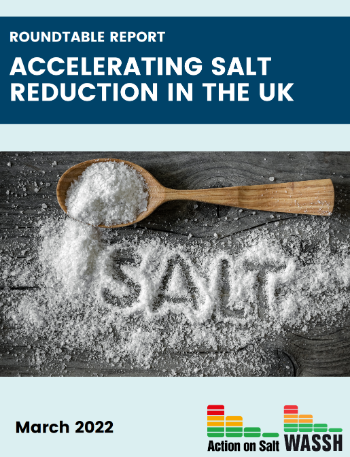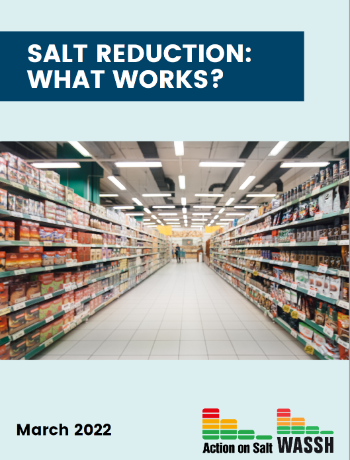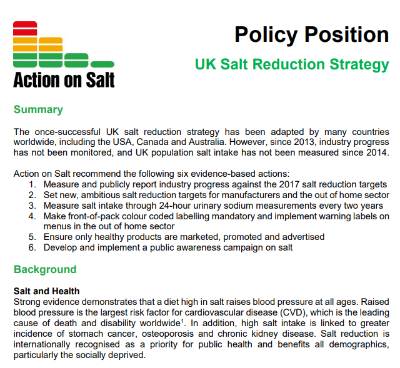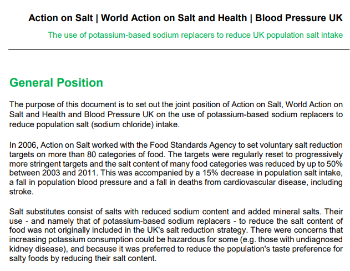Policy
We have the following policy resources available which focus on the UK's salt reduction policy and highlight relevant international policies.
March 2022

Please click here to view the report: Roundtable Report 2022 [PDF 5,576KB]
During Salt Awareness Week 2022, Action on Salt and WASSH hosted a virtual roundtable with key stakeholders to discuss the UK’s salt reduction programme. The purpose of the roundtable was to create consensus that salt reduction progress is needed to prevent cardiovascular disease, responsible for one in four deaths in the UK, and identify how to accelerate progress. Participants discussed broad themes, drawing on their diverse experiences in public health and prevention to identify common ground on the need for salt reduction in the UK, and highlight barriers and opportunities to achieving progress in salt reduction.
Key reflections:
- Salt is a chemical additive and has trace calories, making it easier to reduce in food products than sugar and saturated fat
- The political focus in recent years has been on obesity prevention, and rightly so, but salt reduction is a key prevention initiative to reduce the risk of cardiovascular disease - the cause of one in four deaths in the UK
- The voluntary nature of the UK's salt reduction programme is an issue; all sectors of the food industry must be involved to ensure progress which could be achieved via mandatory targets
- The public must be mobilised to demand lower salt products, in order to influence the food industry and the government to take more action
- A wider range of stakeholders should be involved in the policy, including retail buyers and taste panel participants
- Salt reduction is a global issue and countries worldwide are taking action. We can learn from and build on their success

Please click here to view the report: Salt Reduction: What Works? [PDF 2,780KB]
To mark Salt Awareness Week 2022, Action on Salt and WASSH developed a policy resource highlighting ‘what works’ when it comes to salt reduction policies. Decades of very strong evidence tells us unequivocally that salt negatively impacts health. Robust salt reduction policies must be prioritised to prevent millions of needless deaths globally, and save billions in healthcare costs.
Results from a scoping review of real-world evidence has revealed several key elements, including:
- Bold and ambitious political leadership to implement and maintain salt reduction policies
- Mandatory salt reduction targets to create a level playing field
- Front of pack nutrition labels to incentivise reformulation
- Advocacy to aid the prioritisation of salt reduction on political agendas
- Consumer awareness campaigns to build support for salt reduction, but not to be relied on as a standalone tool for salt reduction
- Interventions in the out of home sector and fiscal measures on added salt products could ensure wider progress

Position Statement - UK Salt Reduction Strategy
Please click to view the position statement: Action on Salt Policy Position - UK Salt Reduction Strategy [PDF 462KB]
In advance of the first report of progress towards the 2017 salt targets (published December 2018), Action on Salt produced the following position statement. In summary, the once-successful UK salt reduction strategy has been adapted by many countries worldwide, including the USA, Canada and Australia. However, since 2013, industry progress has not been monitored, and UK population salt intake has not been measured since 2014.
Action on Salt recommend the following six evidence-based actions:
- Measure and publicly report industry progress against the 2017 salt reduction targets
- Set new, ambitious salt reduction targets for manufacturers and the out of home sector
- Measure salt intake through 24-hour urinary sodium measurements every two years
- Make front-of-pack colour coded labelling mandatory and implement warning labels on menus in the out of home sector
- Ensure only healthy products are marketed, promoted and advertised
- Develop and implement a public awareness campaign on salt
 September 2018
September 2018
Position Statement - Potassium-based Salt Replacers
Please click here to view the position statement: Potassium Salt Position Statement [PDF 462KB]
The purpose of this document is to set out the joint position of Action on Salt, World Action on Salt and Health and Blood Pressure UK on the use of potassium-based sodium replacers to reduce population salt (sodium chloride) intake. We recommend the use of potassium-based sodium replacers as one way the food industry can reduce the sodium content of food products. This will also lead to an increase in potassium intake, which will benefit the health of the UK population. However, further reformulation leading to a gradual reduction of salt content is technically feasible in the majority of foods. We are ultimately working towards reducing population preference for salt and salty foods.


